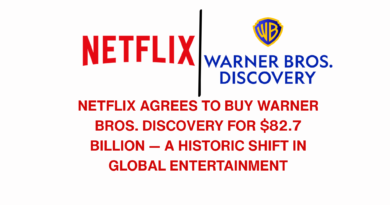Samsung Foundry & Tesla $16.5 Billion Deal for AI6 Chips – Market Impact & Investment Outlook
📌 Deal Overview & Motive
- Contract Value & Timeline
The deal is worth $16.5 billion, running from 2025 through the end of 2033 (eight to nine years). - Product Scope: Tesla’s AI6 Chip
Samsung will manufacture Tesla’s next-generation AI6 SoC (also referred to internally as A16), which surpasses the current AI4 and the intermediate AI5 generations made by TSMC. These are targeted for self-driving, Optimus humanoid robots, and AI training infrastructure. - Facility & Technology Node
Production is tied to Samsung’s new Taylor, Texas foundry. While built with U.S. subsidies around Samsung’s $40 billion U.S. investment, initial volumes may not use full 2 nm node due to yield constraints. Instead, AI6 may rely on matured nodes such as 4 nm or SF3/SF2-class processes.
Strategic Significance
✅ For Samsung
- Revives a Loss-Making Division: Samsung’s foundry business lost over ₩5 trillion (≈ $3.6 billion) in H1 2025.
- Boosts Credibility: Landing Tesla—a flagship client—could attract other major firms and validate the Texas fab’s relevance.
- Share Price Impact: Samsung shares surged by about 6–7%, reflecting investor optimism.
✅ For Tesla
- Supply Diversification: Tesla preserves its in-house chip efforts while maintaining relationships with multiple foundries (Samsung for AI6; TSMC for AI5).
- Operational Control: Elon Musk emphasized Tesla’s hands-on involvement in efficiency improvement, personally overseeing operations at the Texas fab.
- Long-Term Roadmap Support: The AI6 chips enable Tesla’s ambitions in advanced FSD systems, humanoid robotics, and dedicated AI compute infrastructure.
Market Size & Ecosystem Impact
- Global Foundry Landscape: Samsung trails global leader TSMC (≈ 67% market share), with Samsung holding just ~7–8%.
- AI Chip Demand Surge: Automotive, robotics, and AI data centers continue driving unprecedented chip compute requirements—forecasted to reach hundreds of billions USD globally over this decade.
- U.S. Semiconductor Push: Supports Chips Act objectives and South Korea–U.S. tech collaboration amid evolving trade frameworks.
Potential Market Implications
| Stakeholder | Implications |
|---|---|
| Samsung Foundry | Gains major new customer and production volume; elevates its foundry business profile |
| Tesla | Secures reliable, long-term supply for next-gen AI chips without reliance on competitors |
| AI chip ecosystem | Signals rising demand for in-house AI hardware across EVs, robotics, and data centers |
| U.S. semiconductor initiatives | Highlights effectiveness of Chips Act and domestic incentives for advanced fabs |
Future Timeline & Rollout
- Production Timeline:
- Samsung’s Taylor fab expected to begin equipment installation in early 2026, followed by test runs in 2027.
- Broad ramp-up for AI6 chip production likely between 2027–2029.
- Yield Improvement & Scale:
Tesla reportedly set yield targets between 60–70%, which Samsung aims to meet through collaborative optimization.
Investment Takeaways
- Samsung Stock (005930.KS, Samsung Electronics):
Short-term boost already seen; long-term recovery hinges on foundry division profitability and future client wins. - Tesla Stock (TSLA):
Enhances hardware strategy and supply chain resilience; degree of impact depends on execution. - Broader Sector:
Foundry suppliers, semiconductor equipment vendors, and material suppliers (e.g., graphite/graphene) stand to gain as the AI chip ecosystem expands.
Frequently Asked Questions (FAQs)
What exactly is Tesla’s AI6 chip?
AI6 (or A16) is Tesla’s custom-designed SoC for next-gen autonomous driving, humanoid robots, and AI infrastructure tasks, representing a leap beyond current AI4/HW4 capabilities.
Why isn’t Samsung using its 2 nm node for AI6?
Samsung’s 2 nm process still faces yield challenges. Analysts expect AI6 will initially rely on mature 4 nm or similar processes.
Will Tesla stop working with TSMC?
No. Tesla will continue using TSMC for AI5 chips and may iterate AI7 or beyond with multiple partners for diversification.
Can investors buy Samsung Foundry business separately?
Samsung Foundry isn’t independently listed—investors can gain exposure only through Samsung Electronics shares, augmented by industry tech suppliers.
What does this deal mean for U.S. chip policy?
The deal aligns with U.S. strategies under the Chips and Science Act to onshore advanced chip manufacturing and reduce dependence on foreign suppliers.
✅ Summary
This landmark $16.5 billion, multi-year deal between Tesla and Samsung secures Tesla’s AI6 chip supply and provides Samsung’s foundry operations with a critical growth anchor. It deepens Tesla’s vertical integration and supports national chip strategies. For investors and the AI-tech ecosystem, the partnership signals rising stakes and opportunities in custom silicon, reshoring semiconductor production, and self-driving technology innovation.
Keep Reading:
- How Victoria’s Secret’s Les Wexner Made $2 Billion In 3 Months From AI Giant CoreWeave
- Top 10 Richest People in Israel (2025) – Billionaire List by Net Worth
- Dany Garcia: Visionary Entrepreneur, Producer, and Fitness Icon Behind Hollywood’s Power Moves
- Top 50 Richest Chinese Billionaires in 2025
- Pokémon Go Made Niantic Billions. Now It’s Ditching Gaming For AI



